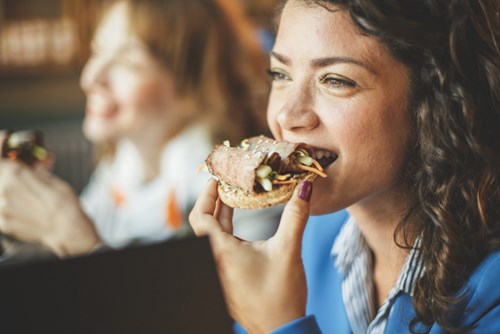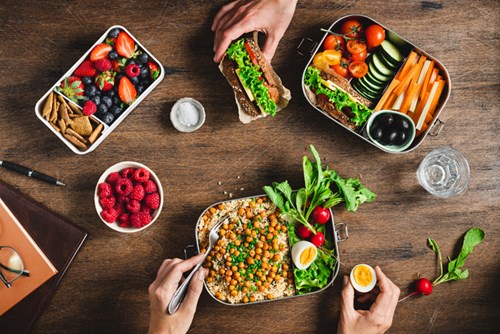
Teens Are Constantly Thinking About Food & Eating.
Here Is What You Can Do To Help.
by Melinda Taylor Schoutens, mother of teens and co-author of Fresh Air Kids
When our children are babies and school-aged, it is our duty to create a safe and healthy environment for them. From what our children eat, drink, when they go to bed and the activities they participate in, we dictate how their days unfold. As soon as our children enter the teens years, we gradually lose the ability to determine their choices. Throughout adolescence, our children now decide for themselves not only what goes on, but also in their bodies. For many parents, we cringe at the choices our teens make.
It’s not uncommon to find crumpled up candy wrappers in their baggy pant pockets and chip bags in their rooms. Despite doing what we can to nurture healthy choices, the choices our children make outside of the home, are completely their own.
As a certified Holistic Health Counselor, nutrition has always been an important aspect of family life. Though our diet is not perfect, I always placed emphasis on doing what I could to offer healthy choices to my children throughout all stages of their lives. From nursing, to making my own baby food, to healthy snack options, I have done what was within my power to create a solid foundation. While our daughter is a delightful omnivore, our son has always been a picky eater.
Nutrition is a lifelong pursuit, very individualistic, and one that continuously evolves and changes with age and time.
As our children enter into the teenage years, there are a few things to keep in mind when trying to positively influence their health.
Talk to your children about the importance of nutrition
In order for your children to understand the significance of healthy eating, explain why eating well is so imperative to their overall health. Nutrition impacts all aspects of our lives. From our ability to concentrate, our physical performance, our sleep cycles, our mood, our hormones, and our general health. Nutrition is so much more than just the food we eat. I like to use the car analogy with my children. A car cannot run without proper fuel. When the tank is empty, the car has nothing to power it by and therefore, the car will not take you where you need to go. The human body is very much the same.
Without proper nutrition, we cannot expect our bodies to operate at optimal performance.
Pack the nutrients in at home

When your children eat at home, make family meals nutritionally rich occasions. Pack in the nutrients whenever possible and aim for whole food nutrition.
Consider breakfasts that are full of protein, carbohydrates and fat as children race out the door to school.
Teens are growing rapidly and their bodies need a range of nutrients. Plan meals rich with both micro (vitamins and minerals) and macronutrients (carbohydrates, healthy fats and protein). Throw veggies and fruit in whenever possible. In some cases, supplements might be helpful, however, check with your pediatrician first.
Not all carbohydrates are created equal

Over the last several years carbohydrates have been lumped together into a single category and are often times considered to be a “bad” or “unhealthy” food group. Please know that not all carbohydrates are the same. An apple is not the same as a bag of gummy candy, nor is white rice the same as brown rice when it comes to their nutritional values. Know the difference and be aware that carbohydrates are an essential macronutrient.
We need carbs to fuel the brain and provide quick bursts of energy.
Fiber rich carbohydrates such as beans, whole grains, seeds, fruits and vegetables are all fantastic ways to incorporate healthy carbohydrates into the diet.
Whole food nutrition
Whole food nutrition should be the focus of your meals. By whole food nutrition I mean food in its most natural state with minimal processing. Think:
Fruits
- berries
- apples
- avocados
- bananas
Vegetables
- green leafy vegetables
- peas
- broccoli
- tomatoes
- peppers
- sweet
- potatoes
Whole grains
- brown rice
- black rice
- quinoa
- millet
Nuts
- almonds
- walnuts
- pecans
- Seeds
- sesame
- flax
- hemp
Eggs, fish and meat.
Aim for high quality ingredients


Sadly, there are enough toxic chemicals in our environment that when it comes to the food we eat, we should try to purchase organic groceries. There are certain items that are recommended to purchase organic due to the high levels of chemicals administered during the growth process. That list includes strawberries, spinach, kale, tomatoes, pears, celery, bell peppers, grapes, apples, peaches, nectarines and cherries.
If your family also consumes dairy, eggs and meat, those products should also be organic. That list is often referred to as the “Dirty Dozen.” Please note, however, that individual countries have different standards for pesticide, fungicide, herbicide, and genetically modified organisms used in agriculture. The “Dirty Dozen” may change according to the country in which you are purchasing your fruits and vegetables from. In addition, organic standards differ depending on individual country standards and requirements.
Recipes for healthy sauces, smoothies, cauliflower pizza - yes its gluten free, and a chocolate cake based on zucchini - also gluten free!
Be aware of changing diets

As children age, they may wish to experiment with their dietary habits. My best advice for these changes is to simply go with it, but be mindful and observant.
After a summer of visiting multiple Alpine farms and understanding more about the food chain, our son made the declaration that he was going to be a vegetarian. With empathy, we embraced his choice. We also explained the importance of maintaining a healthy balance when it came to his food choices. Finally, we discussed the need to be fluid and not dogmatic when it comes to what he eats. Explaining to a child that the choices he or she makes need not be permanent, gives them the opportunity to test what works for them and what doesn’t. Today a vegetarian, tomorrow a carnivore.
Water

Staying hydrated is paramount for the health and well-being of all individuals.
Each morning, place a glass of water on the table with breakfast for your children.
As simple as it may seem, having water readily available to your children throughout the day, is an easy way to remind them without having to tell them to drink. In addition, find a water bottle your children like and encourage them to take it with them to school, sports and throughout their day. By staying hydrated, your children will ward off headaches, false hunger signals and nourish their cells, prevent muscle cramps and a whole slew of other health benefits. Serve water at every meal and avoid sugary drinks.
Outside of the home is out of your control
I have come to realize that what happens in the realm of food choices outside of our home is not within my control.
With that in mind, I do my best to provide healthy options in the house. As parents, it is not our duty to monitor every move our children make. Rather, our primary goal is to create a strong foundation that hopefully guides their choices.
As parents, let us try to establish a healthy relationship between our children and the food they eat, as well as the traditions we observe. May we not forget that eating is an incredibly emotional act, one that often binds us with family and friends. Eating and nutrition should be a beautiful coming together of the family. One that can be shared and enjoyed for years to come.
Discover recipes for teenagers by Good Food. Plus More ideas by cookie&cake and deliciouslyella
About the Author:
Melinda Taylor Schoutens is a mother, wife, educator and author. Born and raised in the United States, she moved with her husband to Switzerland in 2007. Their initial contract of two - years quickly morphed into 14. Learning to be flexible and open to new possibilities has taught her a great deal. Now, as the mother of two children, Basel feels very much like home.
Melinda is a certified Holistic Health Counselor that studied at the Institute for Integrative Nutrition in New York City. Melinda holds a Master’s Degree in Curriculum and Instruction and has taught adults and children on an array of topics. She has designed educational curriculum for years and has curated and delivered a lecture entitled, “The Education of Nature.” She is the author of the Fresh Air Kids Switzerland book series, which you can oder here.
Related Articles
8 Effective Tips for Raising Teens
Tips to help children eat more vegetables
Teaching Responsibility
The top list with the greatest birthday party ideas for kids and teens
How to keep children safe online
Financial Education for Children
Tips for Getting Outside with Older Children
FREE Educational Activities for Kids in Zurich
Why are bedtime stories good for our children
Tips for an Overnight Stay in Mountain Huts in Switzerland
10 Tips for Organising a Hassle-Free Birthday Party for Kids
Is Art Camp Good for Kids? The answer is Yes!
3 Things that an active 6-year old enjoys doing after school
Perfect Farms around Zurich for Birthday Party
The Best Trampoline Parks Around Zurich
8 Tips for Great Family Photos with a Smartphone
6 Insider Tips for a Day in Bern with Kids
Tips on self-development while parenting
Ski and Snowboard Safety Gear for Kids
10 reasons to learn a foreign language!
7 Tips on how to be a parent and a life-long learner at the same time
Staying Healthy this Winter
Choosing the right hiking boots
10 Reasons to Go Hiking with Your Kids
Camping with Kids
Sign up here to hear more from us!
Read more from our list of topics about how to have fun with kids


